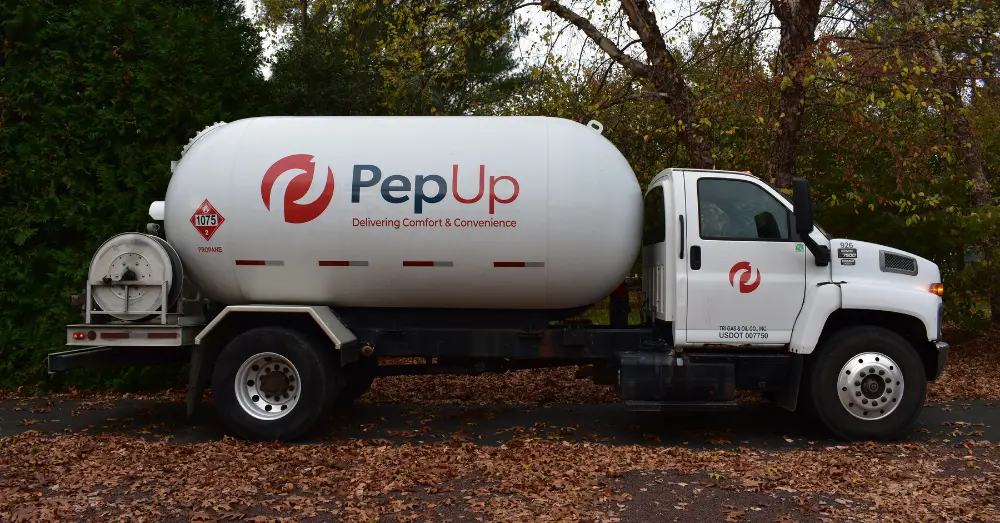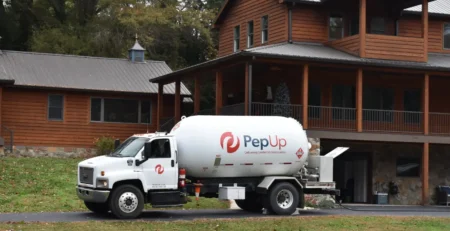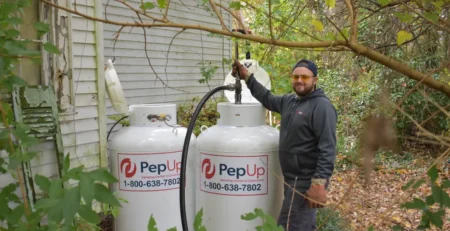10 factors that affect propane cost per gallon
Our delivery drivers and energy specialists are often asked: what is the current propane cost per gallon? We can answer that question pretty quickly, but the harder question is: why does propane cost per gallon fluctuate so much from month to month?
While weather and time of year are familiar factors that influence the price of propane, we wanted to break down a full list of local, national, and international factors that influence prices. Of course, PepUp Promise Plan customers won’t have to worry about changing fuel prices, but for month-to-month customers, it’s helpful to understand what can impact your home energy budget.
For quick reference, here are some links to propane prices in the PepUp service area:
- Want to find out what today’s propane prices look like where you are? This is today’s propane cost per gallon in Delaware, as calculated by the United States Energy Information Administration.
- Looking for current propane prices in Maryland? Check out the EIA current propane prices for Maryland, which are updated weekly.
- Virginia residents can find their propane cost per gallon at the EIA page for current Virginia propane prices. This page is also updated weekly.
10 factors that affect propane cost per gallon, locally and globally
- Market Conditions. The top reason any product changes price is the current state of the market, which is based on the supply on hand, and the consumer demand for that supply. Other market conditions that influence crude oil products like propane include fluctuations in crude oil prices, weather conditions around the world, and global economics.
- Weather Conditions. Extremely cold winters can drive increased demand for propane locally, which then requires propane suppliers to restock their inventory at prices that are usually higher in the winter months.
- Inventory Levels. As propane demand increases, especially during the winter, supplies are depleted and must be restocked. In the summer, demand for propane remains more predictable and slow. Higher inventory levels equate to lower prices in a typical Mid-Atlantic summer.
- Crude Oil Prices. We mentioned crude oil prices as a driving force behind market conditions, but it’s also an independent cause of fluctuations in the cost of propane. Rising oil prices, or demand for crude oil products other than propane, can impact the cost of propane for suppliers and their customers.
- Export and Import Demand. Going back to market conditions and the forces of supply and demand, it’s important to remember that propane is a clean-burning fuel that is traded globally. Supply chain disruptions, increased global demand, and imports can affect domestic propane supply and prices.
- Production and Refining Capacity. Propane is produced at crude oil refineries, and if a refinery is unable to process crude oil due to an equipment failure or supply chain disruption, propane reduction is limited until that refinery is back online. That can limit global supply projections and lead to increased prices.
- Natural Gas Prices. Since propane and natural gas serve many of the same homes and business heating and energy needs, rising natural gas prices have an indirect effect on the price of propane as demand increases from consumers switching to propane.
- Regional Factors. Many parts of the country have higher propane prices than others, simply due to a lack of local transportation and storage infrastructure. Luckily, PepUp customers benefit from geography when it comes to regional propane supply infrastructure. Propane storage facilities that serve the Mid-Atlantic region and the Southeastern U.S. house 55 percent of the nation’s propane. This wealth of LPG supply and infrastructure makes it possible to restock PepUp storage tanks efficiently so we can provide the best propane prices for our customers.
- Market Speculation. Propane is a commodity that can be traded in commodities markets. Investors and traders sometimes speculate on future propane prices, a practice which can have an impact on current propane cost per gallon.
- Government Regulations. As the government requires that refineries and transportation providers comply with new environmental policies or taxes, the result is costs that are passed on to suppliers and consumers.
PepUp’s Promise Plan eliminates some propane price surprises
PepUp customers tell us what they value most about The Promise Plan is that it’s a way to keep prices stable, no matter what’s happening in the rest of the world. Learn more about how to enroll in The Promise Plan and keep your home propane tank filled, without any surprise price increases that could affect your home heating budget.
Questions about the current propane cost per gallon? Ask our energy specialists.
You can always call PepUp with questions about the price of propane, and ways to make propane delivery more economical and worry-free for you and your family, farm, or business. Anytime you need answers about propane, we’re here to help.
Frequently Asked Questions (FAQs) About Propane Prices on Delmarva
Our Energy Specialists have put together answers to these questions they frequently hear from customers, in addition to the ones we’ve included in this guide. Feel free to contact us to learn more about these answers, or ask questions that aren’t yet included here.
Recent price changes stem from factors like seasonal demand shifts, crude oil market fluctuations, and supply/delivery disruptions. Certain events, such as weather, can impact prices heavily. To see current propane prices anywhere in the U.S., visit the U.S. Energy Information Administration Heating Oil and Propane Update page. These prices are updated monthly between April and September, and weekly during the home heating season, October through March.
That depends on when you’re asking, and why. If your tank is well above 50 percent full and it’s early spring, it might pay to wait until prices hit their lowest point in July. Of course, as a PepUp customer, you have the option to sign up for The Promise Plan and level out your propane costs, or even pre-buy propane when prices are at their lowest point each year.
Yes, we offer various price protection plans and long-term contracts to stabilize your costs over time, helping you avoid sudden price increases.
Yes, buying in bulk, especially during off-peak times, can often result in lower rates and savings on your heating costs. Talk with a PepUp Energy Specialist about a propane pre-buy to lock in low propane prices per gallon and save money on winter heating bills.
We strive to offer competitive rates, but we’re not always the cheapest. That’s because customer service and reliability are important to us, and we think they’re important to our customers. Feel free to compare PepUp prices – and service – with any local propane provider, and then contact us to discuss our current pricing, new customer specials, payment plans, and what makes PepUp different.
Improving insulation, sealing drafts, regular maintenance on your heating system, and using programmable thermostats can significantly reduce propane usage and heating costs. Find out where you should start with these energy-saving tips from EmPOWER Maryland.

Meet Contributor and PepUp Delivery Driver, Randy Pendleton
Long-time Annapolis Propane customers in the Glen Burnie District have told us how happy they are to see their favorite driver of nearly a decade continue delivering their home propane with PepUp. Randy knows his customers by name, and he’s always willing to answer questions if you have them. Give him a wave if you see him delivering propane near you!











